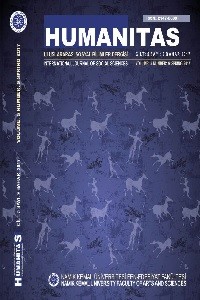Öz
The contemporary success of the global online crowdfunding
platforms; Kickstarter and Indiegogo inspired Turkish entrepreneurs to
develop similar websites for the local use. The websites Fongogo,
Crowdfon, Fonlabeni and Bi Ayda were founded to get the attention of the
Turkish benefactors and angel investors. However, in this funding system
where the website itself has crucial importance as the main tool of the
crowdfunding experience, these local platforms couldn’t reach the success
of their predecessors. The reported issues showed that the failure of the
local websites is linked to their usability problems. The aim of this
research is to determine these usability problems and evaluate efficiency,
effectiveness and satisfaction score of the most widely used Turkish
crowdfunding website; Fongogo. In order to examine this, a quantitative
usability test was carried out to reach a Single Usability Metric (SUM)
with a sample of 14 Turkish users in two age segments between 20-40
and over 40. In addition to the tests, interviews with project owners and
previous users were also conducted. The findings support that the
usability problems affect the funding campaigns negatively and the
website needs to be improved both for benefactors and project owners
Anahtar Kelimeler
Kaynakça
- Gerber, E.M, Hui, J.S. and Kuo, P.Y. (2012). Crowdfunding: Why People Are Motivated to Post and Fund Projects on Crowdfunding Platforms. ACM Conference on Computer Supported Cooperative Work. 11-15 February 2012.
- “Happy Birthday Kickstarter!” (2011) The Kickstarter Blog – Kickstarter. (Online). Available: http://www.kickstarter.com/blog/hppy-birthday-kickstarter. (Retrieved: 2 Jan 2016).
- Resnick, P. and Kraut, R. (2011). Introduction. In Evidence-based Social Design: Mining Social Sciences to Build Online Communities. (pp 1-20). Cambridge: MIT Press.
- Sauro, J. and Kindlund, E. (2005). A Method to Standardize Usability Metrics Into a Single Score. In CHI '05 Proceedings of the SIGCHI Conference on Human Factors in Computing Systems, 401-409.
- Sauro, J. (2004). How long should a task take? Identifying Spec Limits for Task Times in Usability Tests. Retrieved January 1, 2016, from Measuring Usability Web site: http://measuringusability.com/time_specs.htm
- Tekeoğlu, N. (2015). Kitlesel Fonlama ile Alternatif Film Finansmanı Oluşturma ve Bir Film Analizi: Sıradışı İnsanlar. International Journal of Social Science 38: 295-302.
Öz
The contemporary success of the global online crowdfunding platforms; Kickstarter and Indiegogo inspired Turkish entrepreneurs to develop similar websites for the local use. The websites Fongogo, Crowdfon, Fonlabeni and Bi Ayda were founded to get the attention of the Turkish benefactors and angel investors. However, in this funding system where the website itself has crucial importance as the main tool of the crowdfunding experience, these local platforms couldn’t reach the success of their predecessors. The reported issues showed that the failure of the local websites are linked to their usability problems. The aim of this research is to determine these usability problems and evaluate efficiency, effectiveness and satisfaction score of the most widely used Turkish crowdfunding website; Fongogo. In order to examine this, a quantitative usability test was carried out to reach a Single Usability Metric (SUM) with a sample of 14 Turkish users in two age segments between 20-40 and over 40. In addition to the tests, interviews with project owners and previous users were also conducted. The findings support that the usability problems effect the funding campaigns negatively and the website needs to be improved both for benefactors and project owners.
Anahtar Kelimeler
Kaynakça
- Gerber, E.M, Hui, J.S. and Kuo, P.Y. (2012). Crowdfunding: Why People Are Motivated to Post and Fund Projects on Crowdfunding Platforms. ACM Conference on Computer Supported Cooperative Work. 11-15 February 2012.
- “Happy Birthday Kickstarter!” (2011) The Kickstarter Blog – Kickstarter. (Online). Available: http://www.kickstarter.com/blog/hppy-birthday-kickstarter. (Retrieved: 2 Jan 2016).
- Resnick, P. and Kraut, R. (2011). Introduction. In Evidence-based Social Design: Mining Social Sciences to Build Online Communities. (pp 1-20). Cambridge: MIT Press.
- Sauro, J. and Kindlund, E. (2005). A Method to Standardize Usability Metrics Into a Single Score. In CHI '05 Proceedings of the SIGCHI Conference on Human Factors in Computing Systems, 401-409.
- Sauro, J. (2004). How long should a task take? Identifying Spec Limits for Task Times in Usability Tests. Retrieved January 1, 2016, from Measuring Usability Web site: http://measuringusability.com/time_specs.htm
- Tekeoğlu, N. (2015). Kitlesel Fonlama ile Alternatif Film Finansmanı Oluşturma ve Bir Film Analizi: Sıradışı İnsanlar. International Journal of Social Science 38: 295-302.
Ayrıntılar
| Bölüm | Tüm Sayı |
|---|---|
| Yazarlar | |
| Yayımlanma Tarihi | 3 Ağustos 2017 |
| Yayımlandığı Sayı | Yıl 2017 Cilt: 5 Sayı: 9 |









